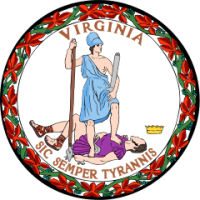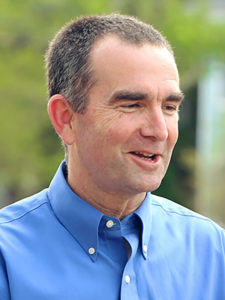
In the open race to serve as Governor of the Commonwealth of Virginia, political operative Ed Gillespie (R) faces Lieutenant Governor Ralph Northam (D-VA). One minor candidate, Cliff Hyra (L), will also be on the ballot. The Constitution of Virginia prohibits governors from serving multiple consecutive terms, so incumbent Governor Terry McAuliffe (D-VA) is ineligible for reelection.
The office of governor is established by the Constitution of Virginia, and the office holder’s primary duty is to serve as the chief of the commonwealth’s executive branch of government. The governor must report on the state of the commonwealth to the General Assembly, convene the legislature when a special session is called, ensure that state laws are executed properly, and serve as commander-in-chief of the state militia. Additionally, governors have the power to submit recommendations to the General Assembly, veto bills (in whole or in part with a line-item veto), commute fines and issue pardons, and restore voting rights to convicted felons.
Virginia governors must be at least thirty years old, citizens of the Commonwealth of Virginia, and have been a resident and registered voter in the commonwealth for five years preceding the date of the election. They are elected to four-year terms and there are no term limits, although governors are prohibited from serving consecutive terms. Virginia is the only state in the United States that does not allow governors to stand for reelection and serve consecutive terms.
Major Candidates
Ed Gillespie (R)

Ed Gillespie (R) stands as the Republican Party nominee for Governor of Virginia.
Gillespie earned a bachelor’s degree from the Catholic University of America and has spent much of his career as a Republican Party operative. He served as a high-ranking aide to Representative Dick Armey (R-TX 26th) and in a number of roles with the Republican National Committee and Republican political campaigns. Notably, he served as a senior communications advisor for the successful 2000 presidential campaign of then-Governor George W. Bush (R-TX).
He was chairman of the Republican National Committee from 2003 to 2005 and chairman of the Republican Party of Virginia from 2006 to 2007, after which he served as a counselor to President Bush. He was general chairman of Bob McDonnell’s (R-VA) successful 2009 gubernatorial run and a senior advisor on Governor Mitt Romney’s (R-MA) failed 2012 presidential campaign.
In 2014, Gillespie sought election as U.S. Senator from Virginia, his first time seeking elective office. He lost narrowly to incumbent Senator Mark Warner (D-VA).
If elected, Gillespie promises a fairly mainstream establishment-Republican agenda. He says he plans to lower taxes, improve government quality and efficiency, improve public safety policy, grow the economy, improve transportation, and improve our education system.
His approach to the economy is basically sound, pairing a plan for reductions in taxes with a plan to reduce unnecessary regulation and licensing regimes. This will result in economic growth, especially for the small businesses that struggle with the regulatory burden today. He also supports efforts to allow development of Virginia’s untapped energy resources. And when it comes to public safety, he supports prudent and moderate efforts to improve our criminal justice system, and improve treatment for people suffering from drug addiction. He also supports long-overdue efforts to improve our mental health services.
On three particularly key issues facing Virginians—transportation, education, and healthcare—Gillespie makes all the routine Republican platitudes. He says he want to take the politics out of transportation decisions, make our transportation infrastructure the best on the east coast, and fix the Washington Metropolitan Area Transit Authority (WMATA or Metro) . . . though he also supports damaging public-private partnerships and toll roads. He says he wants the Virginia education system to focus on innovation and excellence. He says he wants all Virginians to have access to affordable healthcare.
I have heard these talking points countless times from establishment Republicans (and Democrats, for that matter), and little gets done. I doubt Gillespie will be any more effective than his predecessors in these areas.
Gillespie does promise to govern in accord with “timeless conservative principles.” He says he will stand up for fundamental human rights, including the right to life, religious freedom, and the right to keep and bear arms. While I have no reason to doubt that he will govern as a mainstream, center-right conservative on these issues, it is troubling that he treats them almost as an afterthought . . . as if they are a bone he must throw to the conservative wing of his party in order to buy their votes. Many Virginians are understandably suspicious of establishment Republican politicians like Gillespie, who have been far too prone to talk like conservative Republicans before an election and then govern like moderate Democrats after.
In recent years, our fundamental human rights and civil liberties have been under constant attack. We need a governor who lives and breathes them—one who will energetically and unapologetically defend them at every turn. Some things must be non-negotiable in a free society. Gillespie strikes me as the type who would happily bargain away some of these fundamental rights, at least around the edges, in the name of pragmatism, expediency, or compromise.
Ralph Northam (D)

Lieutenant Governor Ralph Northam (D-VA) stands as the Democratic Party nominee for Governor of Virginia.
Northam earned a bachelor’s degree in biology from the Virginia Military Institute and a medical degree from the Eastern Virginia Medical School. He served as an officer and physician in the United States Army, earning the rank of major and completing a pediatric residency and child neurology fellowship. After leaving the army, Northam served as a pediatric neurologist as Children’s Hospital of the King’s Daughters in Norfolk, Virginia.
Describing himself as “conservative on fiscal issues and liberal on social issues,” Northam first ran for political office in 2007 when he sought election to represent the sixth district in the Virginia Senate. In that race, he defeated a two-term Republican incumbent. He was reelected to that office in 2011. In 2013, Northam sought election as Lieutenant Governor of Virginia and won a comfortable victory.
Although Northam has been generally regarded as a moderate, in large part because he is in favor of fiscal responsibility, his campaign positions on other issues are much more in-line with the increasingly hard-left national Democratic Party than with the more pragmatic and moderate positions that Virginians traditionally prefer. He is, in fact, far out of step with the principles that ought to be guiding the commonwealth.
Though he supports a balanced budget, he also supports heavy-handed government regulation that would depress the Virginia economy. He repeats the discredited statistic claiming that “women are paid seventy-eight cents on the dollar compared to men,” which is simply not true. He is antagonistic to the right to life, and brags about being supported by abortion advocates. Northam vehemently opposes common-sense clinic safety regulations and informed consent rules. He is antagonistic toward the right to keep and bear arms, opposing constitutional carry laws and supporting ineffective and unnecessary burdens on gun owners like magazine capacity limits and “one handgun per month” laws.
Northam ought to be smarter than this.
As a physician, Northam knows when human life begins . . . which means that he thinks some human lives just aren’t worth defending. Perhaps this is also why he wants to restrict Virginians’ gun rights, since firearms can also help to protect the innocent from harm. And one would think that an accomplished doctor would have good critical thinking skills, but Northam’s position that human-caused “climate change is real” shows that he is, at best, credulous and easily convinced by assertions without evidence.
On three key issues facing Virginians—transportation, education, and healthcare—Northam also shows a lack of sound judgement. Transportation is not even listed as an issue or policy area on his web site. On education, he gives us another laundry list of platitudes and Democratic Party talking points (which, in fairness, is no worse than what his opponent offers). On healthcare, an area where Northam’s experience as a physician ought to give him significant insight, we have little more than a misguided diatribe about abortion (which is not healthcare) and, believe it or not, climate change. Northam doesn’t even make an empty promise to make healthcare more affordable. I guess avoiding the topic is better than lying about it. . . .
It is a sad commentary on the state of the Democratic Party of Virginia that its standard bearer for the highest office in the commonwealth is a man who stands in firm opposition to human rights and civil liberties, believes in political myths like the gender pay gap and human-caused climate change, and doesn’t have any concrete plans for improving transportation, education, or healthcare in the commonwealth.
Minor Candidate
Cliff Hyra (L)
Cliff Hyra (L) stands as the Libertarian Party nominee for Governor of Virginia. Hyra is an intellectual property attorney, and this is his first campaign for political office.
Typical of Libertarian candidates, Hyra takes strong and proper positions on economic liberty, and would eliminate all unnecessary taxes and regulations. He would significantly reduce government spending, reform eminent domain law, improve ballot access, enact free-market reforms of education and healthcare, and ensure that transportation funds actually go to transportation projects. He is strongly in favor of the right to keep and bear arms, but takes no clear position on other human rights and civil liberties, such as the right to life and the freedom of religion.
Also typical of his party, he supports radical drug legalization, a borderline-lawless immigration system, a significantly limited criminal justice system, and repeal of our marriage amendment (which is now a dead-letter due to recent rulings by the U.S. Supreme Court).
Conclusion
The Republicans have put forth an uninspiring candidate. The Democrats have put forth a poisonous one. And the Libertarians have put forth a Libertarian.
Lieutenant Governor Ralph Northam (D-VA) can be dismissed immediately. He consistently positions himself in opposition to fundamental human rights and civil liberties, and shows ignorance or a lack of judgement on key issues like the economy, the environment, transportation, education, and (surprisingly) healthcare. Perhaps Northam can take the next four years off, put aside his party’s misguided talking points, and re-familiarize himself with the issues as they actually are.
That leaves us with an “establishment” Republican who may or may not have principles, and a Libertarian who, like many Libertarians, is perfectly right about many things while being disastrously wrong about a few.
Working on the assumption that Cliff Hyra (L) is a somewhat “standard-issue” Libertarian, we can fill in some gaps. He likely opposes government protection of the fundamental right to life, but supports the freedom of religion and the right of all people to live in accord with their conscience. He also likely opposes applying existing norms for clinic safety and informed consent to abortion facilities . . . though probably because he would oppose government applying those regulations to any medical facility, which would at least be a principled position (as opposed to the Democratic Party’s shameless political carve-outs only for certain types of facilities).
And we can assume that Ed Gillespie (R) would also fill in the gaps in his public campaign positions with the positions of those in his “establishment” wing of the Republican Party . . . a sort-of pragmatic conservatism that is weaker than it needs to be on fundamental human rights, but at least usually falls on the correct side of the spectrum.
In the end, Gillespie is likely to be a weak defender of human rights and civil liberties, but he will not be openly antagonistic toward them (as Northam likely would) or strongly antagonistic toward some and strongly supportive of others (as Hyra likely would). And while Gillespie does rely too much on traditional Republican establishment talking points, and is not likely to be an especially good governor, it seems unlikely that he would do any serious damage. If nothing else, he will undo at least some of the worst policies enacted by the incumbent. That’s not much, but it’s something.
I endorse the election of Ed Gillespie as Governor of Virginia.
